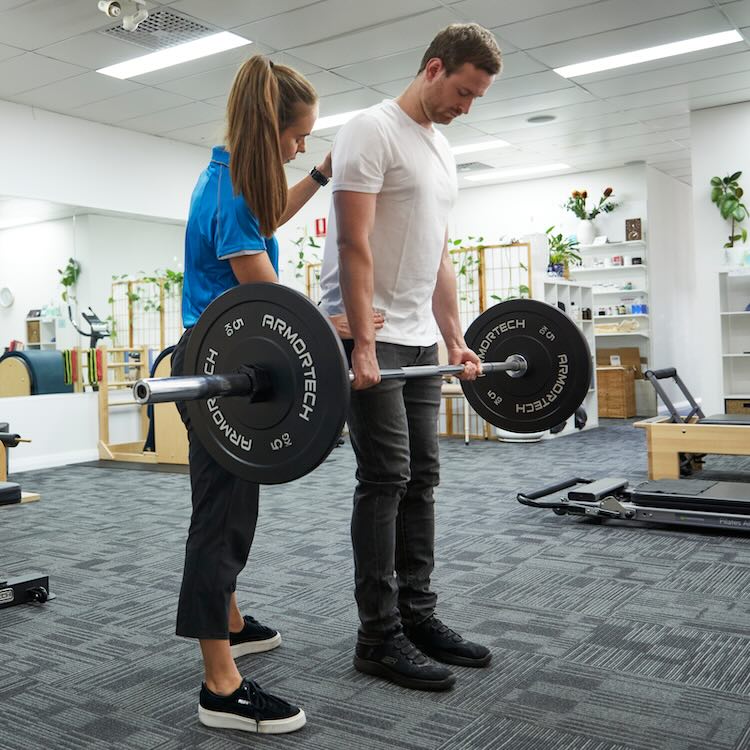3a/352 South Street O’Connor WA 6163 | (08) 93376460
Home » Physio Fremantle » Lower Back Physio
At Next Wave Therapy, our lower back physio in Perth is led by Dr Jonathan Wray, FACP; one of a small number of Specialist Musculoskeletal Physiotherapists in Australia. Drawing on years of advanced training and experience, our team helps you regain control, reduce pain, and get back to the activities you love. If you’re ready for a proven approach to lower back relief, you’re in the right place.
We offer a personalised range of treatments to relieve pain, restore movement, and build long-term resilience. Your physio for back pain may include manual therapy, core-strengthening exercises, ergonomic advice, and techniques like dry needling to ease muscle tension and discomfort.
Our physiotherapists take the time to understand your goals, lifestyle, and any challenges you’re facing. From this assessment, we create a step-by-step recovery plan that delivers fast relief while addressing the root causes—helping you move better now and prevent future flare-ups.
Book an appointment with our expert lower back physios in Perth for reduced pain, improved flexibility and strength, and renewed confidence in everyday activities.
Monday: 9 am – 7 pm
Tuesday: 8 am – 7 pm
Wednesday: 8 am – 6 pm
Thursday: 7 am – 7 pm
Friday: 8 am – 12 pm
Saturday: 8 am – 12 pm
Sunday: Closed

Manipulative physiotherapy focuses on restoring movement and reducing pain in the spine. It involves skilled, hands-on techniques such as joint mobilisation and high-velocity thrusts to release stiff or restricted spinal joints. These methods aim to improve alignment, ease muscle tension, and restore your natural range of motion. For people experiencing lower back pain, sciatica, or spinal discomfort, manipulative physiotherapy can provide fast relief, improve mobility, and support long-term spinal health and function.
Exercise rehabilitation involves a customised program of targeted movements designed to build core strength, improve flexibility, and support your spine through daily activity. Our expert physiotherapists may use elements like clinical pilates, resistance training, and functional strength exercises to gradually restore movement, reduce pain, and prevent future flare-ups.
Ergonomic advice is a key part of your recovery and long-term back health. We assess how you sit, stand, lift, and move throughout the day – whether at work, home, or during exercise – and provide simple, practical adjustments to reduce strain on your lower back. By improving your posture and movement habits, we help you stay comfortable, protect your spine, and prevent flare-ups in everyday life.
We offer a combination of classical Japanese acupuncture and modern dry needling. We find that this combination is ideal for treating a wide range of sports injuries and musculoskeletal conditions. This hands-on therapy involves inserting exceptionally fine, stainless steel needles into trigger points along your muscles and tissues to reduce pain and improve movement and functionality.
As one of the few clinics in Perth with a Specialist Musculoskeletal Physiotherapist, we’re frequently asked to provide expert reviews for lower back pain cases. These specialist physiotherapy assessments offer a second opinion on diagnosis, treatment, and recovery planning; particularly when progress has stalled or the condition is complex. Referrals often come from GPs, insurers, or other health professionals seeking clarity and guidance for persistent or hard-to-diagnose lower back issues.

Lower back pain can be triggered by a range of physical and lifestyle factors. At Next Wave Therapy, we assess each individual thoroughly to understand the root causes. Common contributors include:
• Muscle strain from lifting, twisting, or prolonged sitting
• Poor posture and weakened core muscles
• Disc bulges or facet joint irritation
• Sacroiliac joint dysfunction
• Stress, poor sleep, and low activity levels
Recovery depends on the nature of your lower back pain, your general health, and how early you start treatment. Here’s what to expect:
• Most non-specific lower back pain improves within 2–6 weeks
• Persistent or recurrent issues may require 3–6 months of rehabilitation
• Complex or chronic cases may take longer and benefit from a multidisciplinary approach
• Early movement and personalised physiotherapy greatly speed up recovery


Dr. Wray specialises in managing complex musculoskeletal and sports injuries with a focus on swimming and surfing injuries.

Amy specialises in injury rehabilitation and return-to-sport planning, with a focus on CrossFit, running, and cycling.

Rushil has a passion for treating athletes, with a special focus on golf, racquet sports, cricket, and gymnastics.
Yes, physiotherapy is one of the most effective treatments for lower back pain. A physiotherapist can assess your condition, identify contributing factors, and guide you through a personalised plan involving movement strategies, manual therapy, and exercises to relieve pain and restore function.
The number of physiotherapy sessions needed depends on the cause and severity of your back pain. Many people experience significant improvement within 2–6 sessions, while more persistent or complex cases may require ongoing support over several weeks. Your physio will outline a tailored plan after your initial assessment.
Physiotherapy and chiropractic care can both help with back pain, but physiotherapy typically offers a more comprehensive, exercise-based approach. Physios focus on restoring movement, strength, and function through active rehabilitation, while also addressing posture, ergonomics, and long-term prevention.
A physiotherapist will assess your posture, movement patterns, and spinal mobility to create a treatment plan that may include manual therapy, core-strengthening exercises, and education on managing daily activities. The goal is to relieve pain, improve movement, and prevent future flare-ups.
It’s a good idea to see a physiotherapist if your back pain lasts more than a few days, keeps returning, or limits your ability to move comfortably. Early treatment can help speed up recovery, reduce the risk of chronic pain, and get you back to doing the things you enjoy.
Your initial consultation includes a thorough evaluation, where we take a detailed history and perform a physical assessment. We then provide a clear diagnosis and commence hands-on treatment. Additionally, you’ll receive a comprehensive management plan with prescribed exercises and advice on the recommended frequency and duration of your treatment.
For psychological therapy, we start with a comprehensive evaluation, including a detailed history and mental health assessment. Following this, we provide a clear diagnosis. You’ll also receive a thorough management plan, including guidance on the recommended frequency and duration of your treatment.
Your second consultation, scheduled shortly after the initial visit, allows for feedback and questions. We perform a streamlined re-evaluation through a physical assessment, helping you to see the benefits of the treatment. Subsequent consultations are designed to support your recovery and achieve optimal outcomes for your pain or injury.
For psychological therapy, the second consultation, also scheduled shortly after the initial visit, offers a chance for feedback and questions. A streamlined re-evaluation is conducted, allowing you to experience the benefits of the treatment. Subsequent consultations focus on supporting your recovery and achieving the best outcomes for your mental health.
Cancellations with less than 24 hours notice or non-attendance are billed at 50% of the consult fee and do not qualify for a rebate.
A doctor’s referral is generally not required unless your condition is associated with Workers Compensation, Motor Vehicle Injury, Veterans Affairs, or a Medicare Mental Health Care plan. In most cases, you can directly schedule an appointment since all our physiotherapists are primary contact practitioners capable of providing comprehensive care without a referral.
To access physiotherapy services through Medicare, you must have a referral from your GP under the Chronic Disease Management Plan, often referred to as an Enhanced Primary Care Plan (EPC). This plan is necessary for Medicare coverage when seeing a physiotherapist.
As a person seeking healthcare in WA, you have the right to access, safety, respect, partnership, information, privacy, and the ability to provide feedback. For more detailed information on your rights, review the Australian Charter of Healthcare Rights.
We prioritise your privacy. Our strict privacy policy ensures the confidentiality of your personal information, using it solely for your healthcare. If you have any privacy concerns or questions, please reach out, and we’ll address them promptly. Your trust is crucial to us. Review our privacy policy here.